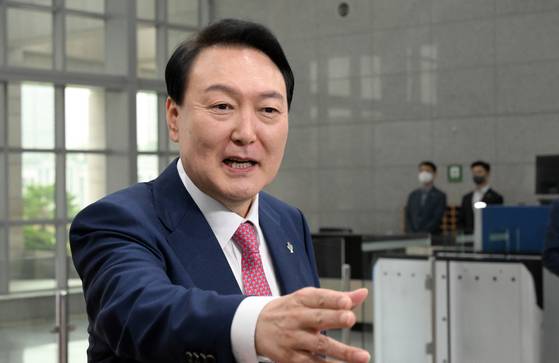Miracles don't come on their own

Lee Ha-kyung
The author is the chief editor of the JoongAng Ilbo.
A perfect storm is threatening the Korean Peninsula. President Yoon Suk-yeol raised the alarm about the mix of crisis factors in the economy. Economic policy chiefs insist on taking emergency and preemptive measures to weather the storm. We are back to the wake of the Asian financial crisis in 1997, where dissident-turned-president Kim Dae-jung helped save the country from the brink of a national default.
Frankly, I had never imagined Kim would become a president. To foreign eyes, he was a symbol and hope for Korean democracy. But at home, he was an anti-government threat to the military regime at war with North Korea. I interviewed Kim when he was confined at home upon returning to Seoul in February 1985 from the U.S., where he had stayed after his release from a death sentence for treason.
Kim was watched day and night by intelligence officers. He had to raise the volume of the FM radio to avoid wiretapping. He should have been defeated by the stifling circumstances. Yet he continued to examine economic, labor, welfare, unification, foreign, and security affairs. He exchanged letters and communications with politicians, intellectuals and journalists around the world.
When Kim was finally — and miraculously — elected president on Dec. 18, 1997, Korea was in a liquidity crisis on the brink of national insolvency. His acceptance speech was closely watched as it could define nation’s fate. He pleaded for “national conciliation and unity” to develop our democracy and market economy. The restrained language of the new leader relieved global leaders. Conservative economic bureaucrats Lee Hun-jai and Lim Chang-yeol, Kim’s former enemies, voluntarily offered to help him in governing. Cardinal Stephen Kim Sou-hwan surrendered the cross he had received at inauguration after the new president proposed a national gold donation campaign to help the country fight a liquidity crisis.
When President Kim made a state visit to the U.S. in June 1998, President Bill Clinton welcomed him warmly at a dinner banquet at the White House, saying everyone became South Koreans at the moment.
Through three defeats in presidential elections, six imprisonments, and at least five brushes with death, Kim had become a reliable commander in chief at times of crisis.
The liquidity crisis in the 1990s was sparked by the Asian-wide financial crisis. Now, the perfect storm in the making is out to devastate the financial markets and economies around the world. Korea is in need of unwavering leadership. But Yoon Suk-yeol is not a well-prepared president. He must make extraordinary efforts to unite the people on the ship sailing in perilous waters. He must reach the people with impressive and empathetic language. Yoon as a career prosecutor would have mostly dealt with suspects, weak people.

President Yoon Suk-yeol answers questions from reporters at the doorstep of his office in Yongsan when he reported to work on June 23. [JOINT PRESS CORPS]
But Yoon is no longer a prosecutor, and the people are not suspects. South Koreans who achieved industrialization and democracy can be patient, but one they lose patience, they explode to impeach a sitting president. Former president Lee Myung-bak was shaken soon after taking office upon the mad cow scare and subsequent nationwide protests, largely owing to a lack of communication with the public. Yoon with similar vulnerabilities despite his frequent “doorstep” interviews with the press must pay heed to the experience of the former president.
German philosopher Martin Heidegger (1889-1976) said, “Language is the house of being.” Poet Kim Soo-young (1921-1968) had been conscripted by the North Korean military and became a prisoner of war during the Korean War. Upon release and returning home to find his wife who had betrayed him by living with his friend during his absence, Kim was gripped by Heidegger’s words to devote himself back to poetry.
He resided in the literary world of poetry, where he found his own voice to transcend his and social sufferings from division, war and military regime. Does the new president really understand the people who endured the shames of ideological irrationalities? He must be all-understanding to win public confidence.
Yoon is the victor from an election. He no longer has to compete with others. He must find a restrained voice and language to seek union and cooperation. If he addresses others with empathy and respect, his opponents and people will respond. I hope he discovers his own ethical singularity and defies stereotypes to pursue the good and truth.
Copyright © 코리아중앙데일리. 무단전재 및 재배포 금지.
- Choo says 6-percent inflation possible, calm about 1,300 won
- BTS's V, Blackpink's Lisa, actor Park Bo-gum attend Paris Fashion Week's Celine show
- After 512 episodes, Yumi and her cells say their final goodbye
- [WHY] Koreans' love-hate relationship with Samsung
- fromis_9 to cancel 'from our Memento Box' events after car crash
- New location, stunning new home for LG Art Center Seoul
- Volkswagen Group Korea names Korean woman as new head of Audi Korea
- Eulji Myeonok shuts its doors as developers move in
- Lee Tae-hwan from 'Thirty-Nine' to join military next Monday
- SHINee movie with concert footage to premiere on June 29